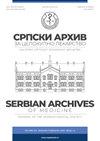Abuse and addictive potential of pregabalin
IF 0.2
4区 医学
Q4 MEDICINE, GENERAL & INTERNAL
引用次数: 0
Abstract
Introduction. In the Republic of Serbia, pregabalin was marketed for the first time in 2006. Although the abuse of pregabalin has not been a common topic in the literature so far, it is often seen in everyday practice. Also, it seems that it is more common among addicts. Case outline. Mr. D. is a 41-year-old male patient, a perennial polytoxicomaniac on buprenorphine substitution therapy. He began using pregabalin because it caused euphoria and elevated mood, in daily doses which varies between 1050-2100 mg. The highest daily dose was 4200 mg. At the time he was admitted to the hospital for pregabalin detoxification, he met the general criteria for addiction syndrome. On admission, the patient was tense, anxious, irritable, drenched in sweat, and had insomnia. With an adequate dose of buprenorphine, the patient continued to complain about the reduction of the pregabalin dose and insisted on adjusting the dose. Shortly he was discharged from hospital at his personal request. After a month, during the check-up examination, he was diagnosed with a relapse of pregabalin use. He was readmitted to the hospital for detoxification treatment, the pregabalin dose was gradually reduced by 100 mg per week. After that the patient went to therapeutic community to continue treatment. Conclusion. This case indicates that practitioners have to be cautious when prescribing pregabalin to people prone to addiction. Further research is needed to identify risk factors for the development of pregabalin abuse syndrome, as well as to create clear guidelines for the treatment of abstinence syndrome.普瑞巴林的滥用和成瘾性
介绍。在塞尔维亚共和国,普瑞巴林于2006年首次上市。虽然普瑞巴林的滥用至今在文献中还不是一个常见的话题,但在日常实践中却屡见不鲜。而且,这似乎在成瘾者中更为常见。大纲。d先生是一名41岁男性患者,长期服用丁丙诺啡替代疗法。他开始使用普瑞巴林,因为它能引起欣快感和情绪高涨,每天的剂量在1050-2100毫克之间。最高日剂量为4200毫克。在他入院接受普瑞巴林戒毒治疗时,他符合成瘾综合征的一般标准。入院时,患者紧张、焦虑、易怒、大汗淋漓、失眠。在丁丙诺啡剂量充足的情况下,患者继续抱怨减少普瑞巴林剂量,并坚持调整剂量。不久,他应自己的要求出院了。一个月后,在体检期间,他被诊断为普瑞巴林使用复发。再次入院进行排毒治疗,普瑞巴林剂量逐渐减少至每周100 mg。之后患者到治疗社区继续治疗。结论。这个案例表明,从业者在给容易上瘾的人开普瑞巴林处方时必须谨慎。需要进一步的研究来确定发展成普瑞巴林滥用综合征的危险因素,并为戒断综合征的治疗制定明确的指导方针。
本文章由计算机程序翻译,如有差异,请以英文原文为准。
求助全文
约1分钟内获得全文
求助全文
来源期刊

Srpski arhiv za celokupno lekarstvo
MEDICINE, GENERAL & INTERNAL-
CiteScore
0.40
自引率
50.00%
发文量
104
审稿时长
4-8 weeks
期刊介绍:
Srpski Arhiv Za Celokupno Lekarstvo (Serbian Archives of Medicine) is the Journal of the Serbian Medical Society, founded in 1872, which publishes articles by the members of the Serbian Medical Society, subscribers, as well as members of other associations of medical and related fields. The Journal publishes: original articles, communications, case reports, review articles, current topics, articles of history of medicine, articles for practitioners, articles related to the language of medicine, articles on medical ethics (clinical ethics, publication ethics, regulatory standards in medicine), congress and scientific meeting reports, professional news, book reviews, texts for "In memory of...", i.e. In memoriam and Promemoria columns, as well as comments and letters to the Editorial Board.
All manuscripts under consideration in the Serbian Archives of Medicine may not be offered or be under consideration for publication elsewhere. Articles must not have been published elsewhere (in part or in full).
 求助内容:
求助内容: 应助结果提醒方式:
应助结果提醒方式:


